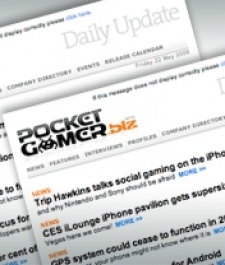Tuning in to watch Mark Zuckerberg snigger his way through his F8 keynote included, it was a typically busy week at PG.biz: the home of news and views on the business of app stores, smartphone platforms, developments in mobile game making and assorted technology.
Indeed, few companies aside from Apple can master the art of building immense amounts of hype around a product that hasn't even been announced yet, but Facebook managed it this week.
The social network's HTML5 venture internally dubbed Project Spartan didn't make its expected appearance at F8 (reportedly dropped so not to steal focus from the site's new timeline based profiles), but that hasn't stopped the world and its wife putting out press releases stating their intention to support it.
Exit strategy
Sibblingz was one of the first to get behind Spartan, setting aside $1 million to add support for the platform to its game engine Spaceport back in August.
This week saw the first fruits of that investment rise to the surface, with Crowdstar, BitRhymes and DeezGames part of a posse of studios committed to using Spaceport to develop titles for Spartan.
Exit Games was also keen not to be left behind. This week saw support for both HTML5 and Windows Phone itself enjoying something of a positive week according to the latest numbers from the US added to version 3 of its networking engine Photon.
Despite such support, however, Qualcomm believes it's business, and not technology, that will drive adoption of HTML5.
"As a technologist, sometimes you just have to step back and say, this is a new technology, the decisions are going to be driven by the people that are generating the revenue," said president of Qualcomm's Internet Services unit, Rob Chandhok.
Platform play
Opinions on just what impact HTML5 and, in particular, Project Spartan will have in the coming years are not so easily defined, however.
Despite its pending popularity, for instance, Mobile Pie's Will Luton told us he wasn't convinced the launch of Spartan would signal the demise of HTML5's rival Flash.
"Yes, it's a little dirty and not mobile friendly, but there's a market there for Flash on the likes of Kongregate, New Grounds etc and as we've seen from J2ME markets, the legacy platforms with entrenched users and tech can remain profitable for a long while," said Luton.
In contrast, not only does YoYo Games' Sandy Duncan think HTML5 will move into the Flash shape void on iOS with Spartan, but it could also have a massive impact on the handheld market.
"In future we won't be thinking about mobile versus desktop," said Duncan.
"That distinction has started to erode with the introduction of iPad and other tablets. I think HTML5 is so important it's the beginning of the end for Nintendo as a hardware company, and Sony will need to get a platform strategy in place fast."
Apotheker and out
Just like last week, however, the prospect of something new was countered by the legacy of something old or, more accurately, dead.
HP finally revealed what we already knew its decision to drop support for webOS would result in a fair number of folk at the firm losing their jobs. Estimates suggest the final figure could come in at well over 500.
This week saw one other casualty as a result of the company's recent failures. CEO Leo Apotheker was unceremoniously dumped just 11 months into his tenure, replaced by Meg Whitman, who previously led eBay for over a decade.
"One, this is a big, big company that requires an executive team to be on the same page, said HP's Ray Lane of Apotheker's run at the top.
"We didn't see an executive team that was working on the same page or working together."
As webOS edges towards an early grave, speculation this week suggested HTC itself a prospective suitor for HP's platform is actually working on its own OS, despite comments from executives suggesting otherwise.
One relativel new already in the game looks to be gaining traction, though it might need a firm push by Microsoft before it can cement its place at the top table.
NPD's latest numbers suggest almost half of smartphone consumers in the US are considering a Windows Phone as their next purchase, though the other half seemingly have no idea what it is.
Peas in an iPod
Microsoft will be hoping the addition of Nokia to the platform's roster of OEMs will help raise Windows Phone's profile accordingly, though the Finnish firm is itself still getting its house in order ready for the launch of its first phone running the OS.
The latest departure from its books was former CTO Richard Green, who is to be replaced by research head Henry Tirri with immediate effect.
"In his new role, Henry will have the opportunity to make a greater impact and set the course for Nokia and our role in the mobile industry," said Elop of the new appointment.
For the moment, however, iOS continues to set the agenda as far as developers are concerned. The latest numbers from Distimo suggest the platform has now become a freemium fiesta, with apps sporting in-app purchases generating 72 percent of all revenue made on the OS.
What makes this even more revealing a stat, however, is that games with in-app purchases make up just 4 percent of the total number of titles on the App Store.
"The figure seemed so low, we had to check with Distimo that it was correct," said PG.biz editor Jon Jordan. "It is."
Expect things to change somewhat when Project Spartan finally makes its presence known its big reveal now expected to form part of Apple's iPhone 5 unveiling.
Not that Apple has confirmed iPhone 5 even exists yet. Spot the similarity there?
PG.biz week that was: Apotheker gets the axe, Project Spartan slips as Facebook refocuses, and developers start to hunger for HTML5
The past seven days' news compressed bite-sized





















